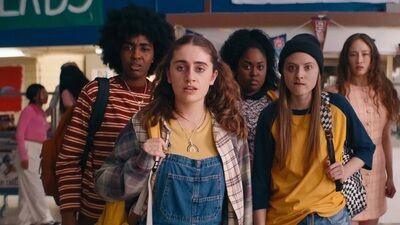As a millennial on the younger side, I was able to relish in a consistent flow of the coming-of-age, rom-com cinema and television from which Emma Seligman’s “Bottoms” was born. Weekly, I would rent everything from the classics of “Never Been Kissed” and “Now and Then” to “How to Deal” and the entire Mary-Kate and Ashley cinematic universe. I’d scour the plot for lessons on how to act and how to feel, for how to do this thing called life. So many installments in the genre include an element of hiding in order to be accepted: hiding your feelings, hiding your intelligence, hiding your true identity. Young people, especially queer young people, have this innate belief that they are not good enough. Everything around us pumps that belief into our brains. The Pantene commercials for how to make your hair soft and long and perfect, the advertisements for how to lose weight fast and what exercises you need to get done before summer comes, all of it quietly nitpicking away at what you need to change to be your optimal self.
And for queer kids, it’s more than that. Sometimes you think the only way to survive is to change, and if not, to keep your head down and out of the line of fire (we see this in “Bottoms” through Hazel, played charmingly by Ruby Cruz). It’s a strange push and pull, the need to be seen and accepted and the deep fear that when you are finally seen, so too will everything that’s wrong with you. In real life, your exclusion is all obsessive conjecture. You get a nagging feeling that certain kids are being treated better than others, but are quickly told it’s in your head and actually it’s just that they’re trying harder than you. You see the allowances given to them when you and your fellow bottom feeders aren’t given an inch. All the while, you are being gaslighted by society and by authority figures into believing that you are the ones that need fixing and that you too can be treated with dignity and compassion if only you’d try harder, if you’d just get into this little box.
The absurdity of “Bottoms” is key because it’s saying the quiet part out loud. They’re screaming “we don’t care about you” with the posters covering the school walls of Jeff, the beloved and deeply stupid quarterback. PJ (Rachel Sennott) and Josie (Ayo Edebiri) are reminded they don’t matter by their principal not even a half hour into the film. They’re surrounded by that knowledge and the evidence of it.
Though PJ and Josie have leaned into their outsider status, they still clamor for attention and try their best to be noticed by the beautiful cheerleaders they pine for. Naturally, when given the opportunity to speed up the process of their acceptance they take it, PJ gleefully and Josie more reluctantly. The best way to be accepted is to make yourself useful, and if they can provide the security of a self-defense fight club while also gaining proximity to the cool kids, then so be it. A problem becomes apparent immediately as the plan takes form, a problem that is for the audience to see coming and for PJ and Josie to sort out: building relationships on lies never ends well, whether it’s building a community or a romance. As much as we want to be someone else, we are who we are, and running from that, or burying it in white lies, isn’t going to change that.

